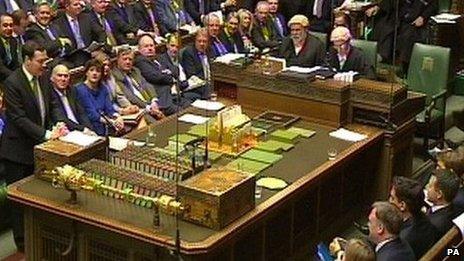Autumn Statement: Osborne lays down gauntlet to Labour
- Published

It was a highly political Autumn Statement right from the first paragraph - when the chancellor claimed that the opposition had been "proved comprehensively wrong" while he had "held" his nerve.
He was keen not just to savage Labour's record, but to lay political traps for the future, too.
Labour has signed up to the chancellor's limits on day-to-day spending in 2015/16, though they say they would spend the same amount of money on different priorities.
That did not play in to George Osborne's preferred narrative that "tax-and-spend" Labour would borrow more from day one if trusted with office again.
So today he came up with a new test.
He will bring forward a charter - agreed with the Lib Dems - which would commit the government to reducing debt as a percentage of GDP.
There will be a parliamentary vote and the hope is Labour will be unable to commit to doing so.
'Job not done'
Never mind that the chancellor has missed his own debt target. Or that he is taking longer to clear the structural deficit than he originally anticipated.
This highly political occupant of Number 11 believes he can portray Labour as irresponsible if it doesn't also commit to balancing the books, and to bringing historic levels of debt down year by year.
Shadow chancellor Ed Balls has said he "wouldn't be stupid enough" to fall for this ruse. Labour would have fiscal rules of its own in its next manifesto, he added, telling the BBC he did not "have a problem with falling debt" or bringing the books into surplus, but stating he would respond to the charter when he saw it.
Mr Osborne trumpeted revised growth figures - substantially up next year on previous forecasts, though ever so slightly down in the two subsequent years. He highlighted improved employment prospects - for him, presumably, as well as the wider workforce, as this news was rapturously received on the Conservative back benches.
He proclaimed that the economy was outperforming not just France but that continental powerhouse, Germany.
But he stressed both at the beginning and the end of his speech that "the job is not yet done".
That is because Conservative strategists fear that if the electorate believe the worse is over, they may have the confidence to vote for an opposition that is promising to help them with their cost of living - and they may be an awful lot less worried about whether Ed Balls' signature is on a debt charter.
So the chancellor also attempted to neutralise Labour's potent attack that, on average, people are worse off under the coalition.
The opposition - polls suggest - has claimed the "cost of living territory" as its own.
'Smart'
So Mr Osborne ventured in to hostile terrain to deal with what he calls a "transparent" con of an energy-price freeze and followed this up with a freeze of his own, on fuel duty - and a pledge to keep train fare increases down.
He hopes if he can battle Labour to a standstill on these issues and voters will then focus on the government's economic message.
This is more fertile territory for him.
It was no mistake that he mentioned taking "difficult decisions" at least 10 times.
Focus groups among swing voters conducted for the Labour think-tank Progress suggest that the Conservatives are seen as "mean" - but, crucially, also "smart" for tackling the deficit, and they are given credit for doing what is "difficult" rather than "popular".
So shaving a bit more off future departmental expenditure reinforces their reputation for taking tough decisions which others might shirk.
But despite being ahead in the polls on economic competence, the Conservatives are behind on voting intention.
So Labour believes there is all to play for.
And it is pleased that the chancellor has had to stray on to its ground.
Today they Labour drove its new poster around Westminster.
Looking for all the world like the "tax bombshell" campaign conducted by former Conservative Party chairman Chris Patten - and believed to have helped John Major win a difficult election in 1992 - Labour's poster warned of a "cost of living bombshell".
If voters are feeling the force of that blast rather than still reeling from the debt crisis, the opposition is confident that the chancellor's apparent economic success will yet blow up in his face.
So George Osborne will have to hope that his colleagues' nerves, like his, are holding and not fraying as the election draws closer.